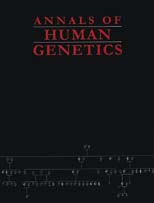Crossref Citations
This article has been cited by the following publications. This list is generated based on data provided by
Crossref.
Zhao, Hongyu
Merikangas, Kathleen R.
and
Kidd, Kenneth K.
1999.
On a Randomization Procedure in Linkage Analysis.
The American Journal of Human Genetics,
Vol. 65,
Issue. 5,
p.
1449.
Kidd, Judith R.
Pakstis, Andrew J.
Zhao, Hongyu
Lu, Ru-Band
Okonofua, Friday E.
Odunsi, Adekunle
Grigorenko, Elena
Tamir, Batsheva Bonne-
Friedlaender, Jonathan
Schulz, Leslie O.
Parnas, Josef
and
Kidd, Kenneth K.
2000.
Haplotypes and Linkage Disequilibrium at the Phenylalanine Hydroxylase Locus, PAH, in a Global Representation of Populations.
The American Journal of Human Genetics,
Vol. 66,
Issue. 6,
p.
1882.
Zapata, Carlos
2000.
THE D′ MEASURE OF OVERALL GAMETIC DISEQUILIBRIUM BETWEEN PAIRS OF MULTIALLELIC LOCI.
Evolution,
Vol. 54,
Issue. 5,
p.
1809.
Zapata, Carlos
2000.
THE D' MEASURE OF OVERALL GAMETIC DISEQUILIBRIUM BETWEEN PAIRS OF MULTIALLELIC LOCI.
Evolution,
Vol. 54,
Issue. 5,
p.
1809.
Mateu, Eva
Calafell, Francesc
Lao, Oscar
Bonné-Tamir, Batsheva
Kidd, Judith R.
Pakstis, Andrew
Kidd, Kenneth K.
and
Bertranpetit, Jaume
2001.
Worldwide Genetic Analysis of the CFTR Region.
The American Journal of Human Genetics,
Vol. 68,
Issue. 1,
p.
103.
Osier, Michael V.
Pakstis, Andrew J.
Goldman, David
Edenberg, Howard J.
Kidd, Judith R.
and
Kidd, Kenneth K.
2002.
A Proline‐Threonine Substitution in Codon 351 of ADH1C Is Common in Native Americans.
Alcoholism: Clinical and Experimental Research,
Vol. 26,
Issue. 12,
p.
1759.
Osier, Michael V.
Pakstis, Andrew J.
Goldman, David
Edenberg, Howard J.
Kidd, Judith R.
and
Kidd, Kenneth K.
2002.
A Proline‐Threonine Substitution in Codon 351 of ADH1C Is Common in Native Americans.
Alcoholism: Clinical and Experimental Research,
Vol. 26,
Issue. 12,
p.
1759.
Osier, Michael V.
Pakstis, Andrew J.
Soodyall, Himla
Comas, David
Goldman, David
Odunsi, Adekunle
Okonofua, Friday
Parnas, Josef
Schulz, Leslie O.
Bertranpetit, Jaume
Bonne-Tamir, Batsheva
Lu, Ru-Band
Kidd, Judith R.
and
Kidd, Kenneth K.
2002.
A Global Perspective on Genetic Variation at the ADH Genes Reveals Unusual Patterns of Linkage Disequilibrium and Diversity.
The American Journal of Human Genetics,
Vol. 71,
Issue. 1,
p.
84.
Chattopadhyay, Pratima
Pakstis, Andrew J
Mukherjee, Namita
Iyengar, Sudha
Odunsi, Adekunle
Okonofua, Friday
Bonne-Tamir, Batsheva
Speed, William
Kidd, Judith R
and
Kidd, Kenneth K
2003.
Global survey of haplotype frequencies and linkage disequilibrium at the RET locus.
European Journal of Human Genetics,
Vol. 11,
Issue. 10,
p.
760.
Oota, Hiroki
Pakstis, Andrew J.
Bonne‐Tamir, Batsheva
Goldman, David
Grigorenko, Elena
Kajuna, Sylvester L. B.
Karoma, Nganyirwa J.
Kungulilo, Selemani
Lu, Ru‐Band
Odunsi, Kunle
Okonofua, Friday
Zhukova, Olga V.
Kidd, Judith R.
and
Kidd, Kenneth K.
2004.
The evolution and population genetics of the ALDH2 locus: random genetic drift, selection, and low levels of recombination.
Annals of Human Genetics,
Vol. 68,
Issue. 2,
p.
93.
Kidd, K. K.
Pakstis, A. J.
Speed, W. C.
and
Kidd, J. R.
2004.
Understanding Human DNA Sequence Variation.
Journal of Heredity,
Vol. 95,
Issue. 5,
p.
406.
Tishkoff, Sarah A
and
Kidd, Kenneth K
2004.
Implications of biogeography of human populations for 'race' and medicine.
Nature Genetics,
Vol. 36,
Issue. S11,
p.
S21.
Palmatier, M A
Pakstis, A J
Speed, W
Paschou, P
Goldman, D
Odunsi, A
Okonofua, F
Kajuna, S
Karoma, N
Kungulilo, S
Grigorenko, E
Zhukova, O V
Bonne-Tamir, B
Lu, R-B
Parnas, J
Kidd, J R
DeMille, M M C
and
Kidd, K K
2004.
COMT haplotypes suggest P2 promoter region relevance for schizophrenia.
Molecular Psychiatry,
Vol. 9,
Issue. 9,
p.
859.
Paschou, P.
Feng, Y.
Pakstis, A.J.
Speed, W.C.
DeMille, M.M.
Kidd, J.R.
Jaghori, B.
Kurlan, R.
Pauls, D.L.
Sandor, P.
Barr, C.L.
and
Kidd, K.K.
2004.
Indications of Linkage and Association of Gilles de la Tourette Syndrome in Two Independent Family Samples: 17q25 Is a Putative Susceptibility Region.
The American Journal of Human Genetics,
Vol. 75,
Issue. 4,
p.
545.
Osier, M.V.
Lu, R.‐B.
Pakstis, A.J.
Kidd, J.R.
Huang, S.‐Y.
and
Kidd, Kenneth K.
2004.
Possible epistatic role of ADH7 in the protection against alcoholism.
American Journal of Medical Genetics Part B: Neuropsychiatric Genetics,
Vol. 126B,
Issue. 1,
p.
19.
Horne, Benjamin D.
and
Camp, Nicola J.
2004.
Principal component analysis for selection of optimal SNP‐sets that capture intragenic genetic variation.
Genetic Epidemiology,
Vol. 26,
Issue. 1,
p.
11.
Kidd, Kenneth K.
2005.
Encyclopedia of Genetics, Genomics, Proteomics and Bioinformatics.
Han, Yi
Oota, Hiroki
Osier, Michael V.
Pakstis, Andrew J.
Speed, William C.
Odunsi, Adekunle
Okonofua, Friday
Kajuna, Sylvester L.B.
Karoma, Nganyirwa J.
Kungulilo, Selemani
Grigorenko, Elena
Zhukova, Olga V.
Bonne-Tamir, Batsheva
Lu, Ru-B
Parnas, Josef
Schulz, Leslie O.
Kidd, Judith R.
and
Kidd, Kenneth K.
2005.
Considerable Haplotype Diversity within the 23kb Encompassing the ADH7 Gene.
Alcoholism: Clinical and Experimental Research,
Vol. 29,
Issue. 12,
p.
2091.
Sawyer, Sarah L
Mukherjee, Namita
Pakstis, Andrew J
Feuk, Lars
Kidd, Judith R
Brookes, Anthony J
and
Kidd, Kenneth K
2005.
Linkage disequilibrium patterns vary substantially among populations.
European Journal of Human Genetics,
Vol. 13,
Issue. 5,
p.
677.
Swan, G E
Valdes, A M
Ring, H Z
Khroyan, T V
Jack, L M
Ton, C C
Curry, S J
and
McAfee, T
2005.
Dopamine receptor DRD2 genotype and smoking cessation outcome following treatment with bupropion SR.
The Pharmacogenomics Journal,
Vol. 5,
Issue. 1,
p.
21.




